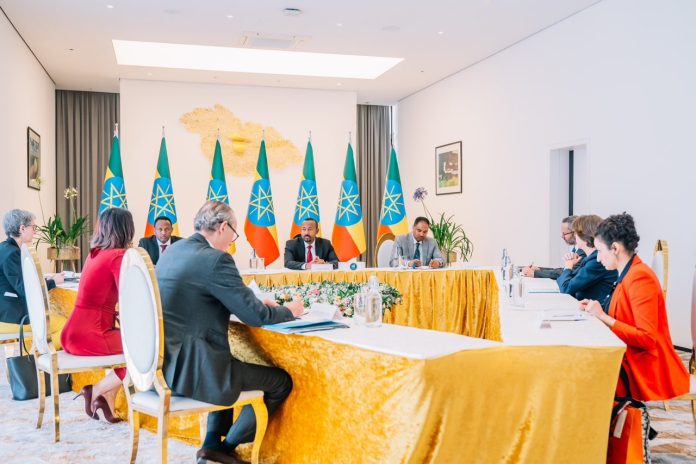Luise Amtsberg, Federal Government Commissioner for Human Rights Policy and Humanitarian Assistance at the Federal Foreign Office, is travelling to Ethiopia from 11 to 14 April and subsequently to South Sudan from 14 to 16 April.
In Ethiopia, meetings with civil society will be at the top of her agenda, including talks with human rights defenders and women’s rights organisations. She will also visit a women’s refuge that offers support to victims of sexual violence. A gathering with representatives of humanitarian organisations will offer the Human Rights Commissioner the opportunity to gain a comprehensive overview of the current humanitarian situation. Her talks with the Ethiopian Government will focus in particular on Ethiopia’s efforts to establish a mechanism for transitional justice to address the human rights violations committed during the Tigray conflict. The itinerary will be rounded off by a visit to a local project as well as talks with representatives of the African Union.
The Human Rights Commissioner’s visit to South Sudan, just under 12 years since the country gained independence and two years before the transitional phase of the peace agreement ends, underlines the importance that we attach to a successful outcome of the peace process in the country. At the same time, this visit offers the opportunity to clearly set out our expectations with regard to the implementation of the peace agreement. These include security sector reform, transitional justice, women’s participation and the improvement of the human rights situation. Talks with government representatives, civil society, NGOs and the UN will focus on paths out of the humanitarian crisis and on Germany’s humanitarian and human rights work. A trip to the camps for internally displaced persons in the northern town of Bentiu, which are now surrounded by floodwater, will allow the Commissioner to meet with those affected, talk to them about the impact of the climate crisis on the humanitarian situation, and emphasise the importance of taking action against gender-based violence.
Prior to her departure she issued the following statement:
“Although the weapons have fallen silent in northern Ethiopia, the people there are still suffering. Efforts to address the human rights violations that have taken place are only just beginning. I am therefore travelling to Ethiopia, following the joint visit by Foreign Minister Baerbock and her French counterpart Catherine Colonna in mid‑January, so that I can learn more about the progress of the peace process and the National Dialogue to address human rights violations, as well as the challenging situation facing women and girls in the country. The German Government is interested in a serious expansion of its relations with Ethiopia and remains a reliable partner, including in the sphere of humanitarian assistance. In light of the devastating drought in the Horn of Africa, Germany’s humanitarian assistance efforts remain crucial.
Following this visit, I will travel on to the world’s youngest state, South Sudan, to focus attention on one of the forgotten crises of our age. The country is still ravaged by conflict and violence. I will hold talks and visit projects on the ground to gain an overview of the difficult human rights situation as well as the significant humanitarian need in the country. According to United Nations figures, three quarters of the population of South Sudan are dependent on humanitarian assistance, and the impact of the climate crisis is exacerbating displacement and food insecurity. My visit is intended to help South Sudan’s people and its civil society make their voices heard – something which, sadly, often does not happen in light of the many other crises around the world.”

